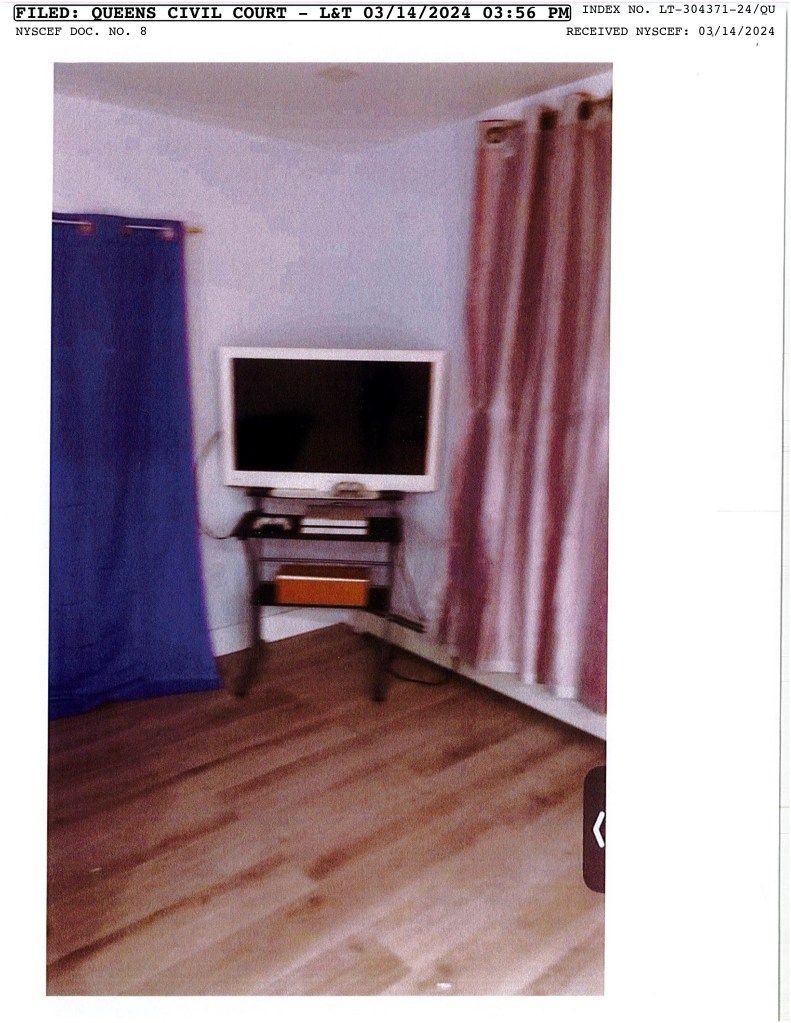Alleged squatters serve up $25 Shake Shack receipt to claim $930K NYC home is legally theirs
Contact The Author
They’ll take two burgers and the house to go.
Two alleged squatters served up a $25 Shake Shack receipt among several pieces of evidence they claim shows they have legal rights to live in a $930,000 New York home.
Rondie L. Francis and Lance Hunt sued Denis Kurlyand and Juliya Fulman, the owners of the duplex on Lakewood Avenue in Jamaica, Queens, on March 14 after they were kicked out of the property.
Francis and Hunt claim they have a lease, paid rent and have been illegally locked out.
They filed several pieces of evidence in Queens County Court, including an application approval letter, a rental lease and mail that was addressed to them at the home.
They also produced a screenshot of an Uber Eats receipt from the Jamaica Avenue Shake Shack for $25.27, purportedly showing they had food delivered to the address in January.
All of it is an effort to establish their move-in date.
Under New York City law, squatters only have to occupy a property for 30 days before they’re eligible for legal protections that make it difficult for the owner to evict them.
What you need to know about squatters in New York:
What are squatter’s rights in New York?
Squatters in New York state can claim a legal right to remain on a property without the owner’s permission after 10 years of living there. However, in New York City, a person only needs to be on the property for 30 days to claim squatter’s rights.
Why is it so hard to get rid of a squatter?
Squatters are allowed a wide range of rights once they have established legal occupancy, making it difficult to evict them.
How does someone become a squatter?
Some of the scenarios in which a person becomes a squatter include: a tenant refusing to pay rent, a relative of a former owner refusing to leave the property or even a stranger who entered the property and never left.
According to Manhattan-based law firm Nadel & Ciarlo, squatters must have a reasonable basis for claiming the property belongs to them and must treat the home as if they were an owner — such as doing yard work or making repairs.
How can a property owner get rid of a squatter?
A property owner must first send a 10-day eviction notice and then file a court complaint if the order is ignored. If approved by a judge, the owner can get a summons and have a sheriff evict the squatter.
Why does the law provide squatters with rights?
The law was designed to help prevent long-term tenants from getting evicted. New York City’s law was partially made in response to vacant and abandoned buildings that were becoming a blight on the city.
How can property owners protect themselves from squatters?
Owners should avoid keeping any properties vacant for an extended period of time. They should also make sure the building is secure, has adequate lighting and has surveillance cameras installed.
If a squatter does appear, owners should notify the police quickly before squatter’s rights are established.
The pair wants a court to force the owners to give them a key to the front door, or grant them permission to change the locks.
The suit lists the starting date of the lease as Jan. 1, 2024, claiming the men received an application approval letter and a lease from Top Nest Properties, the real estate company that handles the home.
According to the document, Francis and Hunt paid $4,000 to cover the security deposit and first month’s rent under the terms of the lease agreement signed on Jan. 1, additionally stating rent was “dutifully” paid on Feb. 1 and March 1 to cover rent for those months.
Kurlyand and Fulman, who records show own the home via Lakewood Queens Property LLC, told The Post Sunday that the documents presented in court were fraudulent.
Get all the stories that move New York to your inbox
Sign up for our Metro Daily newsletter!
Thanks for signing up!
“Everything they’re presenting is fraudulent,” Kurlyand said, with Fulman further claiming that the documents are “clearly photoshopped.”
Reached by phone Monday, the couple’s attorney Rispah Morrow declined to comment because the matter was still ongoing.
The attorney for Francis and Hunt did not respond to an email or phone call seeking comment about the legitimacy of his clients’ documents.



















